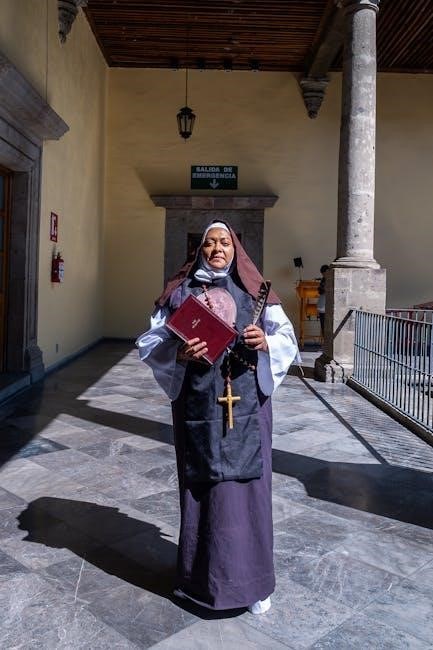The prophets of the Bible were messengers of God, delivering divine messages of warning, hope, and redemption to His people.
Their role was pivotal in guiding Israel and emphasizing moral and spiritual principles, shaping the nation’s identity and future.
Understanding their ministries in chronological order provides insights into Israel’s history and God’s plan for humanity.
1.1 Definition and Role of Prophets in the Bible
The prophets of the Bible were messengers of God, called to speak on His behalf to deliver divine messages to individuals, communities, or nations. Their role was to communicate God’s will, often calling people to repentance, advocating for social justice, and foretelling future events. Prophets were not only predictors of the future but also spiritual guides, emphasizing moral and ethical living.
They served as intermediaries between God and humanity, addressing both spiritual and societal issues. Their messages often emphasized repentance, redemption, and the coming Messiah, fulfilling a dual role as messengers and intercessors for God’s people.
1.2 Importance of Understanding Prophets in Chronological Order
Understanding the prophets in chronological order provides clarity on the historical context of their ministries and messages. This arrangement highlights how their teachings align with Israel’s history, such as the monarchy, exile, and restoration. It reveals the progression of God’s plan, emphasizing themes like redemption and justice. Chronological study also shows how earlier prophecies laid the groundwork for later ones, creating a cohesive narrative. This approach deepens the understanding of the Bible’s overarching story and the fulfillment of messianic hopes. It bridges the connection between historical events and divine revelation, offering insights into God’s dealings with humanity.

Early Prophets of the Bible
Moses and Joshua were among the earliest biblical prophets, leading Israel out of Egypt and into the Promised Land, establishing foundational teachings and divine guidance.
2.1 Moses (c. 1391-1271 BCE)
Moses, a central figure in the Bible, led the Israelites out of Egyptian slavery and received the Ten Commandments from God on Mount Sinai.
He is celebrated for his leadership during the Exodus and his role in establishing Mosaic Law, which shaped Israel’s religious and moral framework.
Moses’s prophetic ministry emphasized obedience to God’s commands and the promise of a future homeland, making him a foundational prophet in biblical history.
His teachings and actions laid the groundwork for Israel’s identity and spiritual practices, solidifying his legacy as a pivotal prophet.
2.2 Joshua (c. 1250-1200 BCE)
Joshua succeeded Moses as Israel’s leader, guiding the people into Canaan and overseeing the conquest of the Promised Land.
He is known for his unwavering obedience to God, exemplified in the miraculous fall of Jericho and the defeat of Canaanite forces.
Joshua’s leadership emphasized faith and trust in God’s promises, culminating in the renewal of the covenant at Shechem.
His ministry marked the transition from wilderness wanderings to settled life, securing Israel’s inheritance and establishing a foundation for future generations.

Pre-Exilic Prophets
The pre-exilic prophets, active before the Babylonian Exile, called Israel to repentance, emphasized social justice, and foretold judgment and redemption, including the coming Messiah.
3.1 Elijah (9th Century BCE)
Elijah, a prominent prophet in the 9th century BCE, ministered during King Ahab’s reign in Israel. He confronted idolatry, notably challenging the prophets of Baal on Mount Carmel, demonstrating God’s power through fire. Elijah’s ministry emphasized repentance and divine justice, culminating in his miraculous ascent to heaven in a whirlwind. His role as a prophet and his mystical experiences, such as being fed by ravens, underscored his unique connection to God, making him a pivotal figure in Israel’s spiritual history and a symbol of divine intervention.
3.2 Elisha (9th Century BCE)
Elisha succeeded Elijah as a prophet in the 9th century BCE, continuing his mentor’s mission to restore Israel’s faith in God. Known for his miraculous deeds, Elisha performed wonders such as healing Naaman of leprosy and multiplying oil for a widow. His ministry emphasized compassion and divine intervention, showcasing God’s care for His people. Elisha’s prophetic role extended beyond Israel, addressing neighboring nations and reinforcing the moral and spiritual principles of his time. His legacy as a prophet and miracle worker remains significant in biblical history.
3.3 Amos (c. 780-755 BCE)
Amos, a prophet from Judah, preached primarily in the northern kingdom of Israel during the 8th century BCE. A shepherd by occupation, he emphasized social justice and condemned oppression, calling Israel to repentance. His messages highlighted the need for moral integrity, famously declaring, “Let justice roll down like rivers.” Amos denounced the exploitation of the poor and warned of impending judgment if Israel did not align with God’s will. His prophecies included the eventual destruction of Israel if they refused to repent, marking him as a pivotal voice for reform in a corrupt society.
3.4 Hosea (c. 760-710 BCE)
Hosea prophesied during the 8th century BCE, primarily addressing the northern kingdom of Israel. His ministry emphasized God’s love for His people and their recurring unfaithfulness. Hosea’s prophecy is unique, as God instructed him to marry a woman who would be unfaithful, symbolizing Israel’s spiritual adultery. He called the people to repentance, urging them to return to the Lord and embrace covenant faithfulness. Hosea’s messages were marked by compassion and a deep sense of divine sorrow over Israel’s rebellion. His prophecies also included warnings of impending judgment, including the eventual fall of the northern kingdom to Assyria.
3.5 Micah (c. 740 BCE)
Micah prophesied during the 8th century BCE, primarily addressing the southern kingdom of Judah. His messages focused on social justice, condemning oppression and corruption among leaders. Micah emphasized the importance of living with integrity, mercy, and humility, calling the people to repentance. He also delivered a famous messianic prophecy, foreseeing a future ruler born in Bethlehem who would bring peace and unity to Israel. Micah’s prophecies balanced judgment with hope, urging the people to trust in God’s faithfulness and ultimate redemption. His teachings remain relevant, highlighting the enduring importance of moral accountability.
3.6 Isaiah (c. 740-680 BCE)
Isaiah prophesied during a time of political turmoil and spiritual decline in Judah, calling the nation to repentance and faith in God. His prophecies emphasized judgment for sin, the promise of redemption, and the coming Messiah. Isaiah’s ministry spanned several decades, addressing both the northern and southern kingdoms. His prophecies included the virgin birth of a savior and the restoration of Israel. Isaiah’s teachings are renowned for their poetic depth and theological richness, making him one of the most influential prophets in the Bible. His messages continue to inspire hope and faith in God’s ultimate plan of salvation.
3.7 Nahum (c. 666-615 BCE)
Nahum prophesied during a time of Assyrian dominance, focusing primarily on the impending doom of Nineveh, the Assyrian capital. His prophecies were fiery and poetic, emphasizing God’s judgment on oppression and injustice. Nahum’s message brought comfort to Judah, assuring them of God’s vengeance against their oppressors. His prophecies culminated in the fall of Nineveh in 612 BCE, fulfilling his predictions. Nahum’s teachings highlight God’s holiness, justice, and ultimate triumph over evil, serving as a reminder of divine sovereignty and the consequences of sin.
3.8 Zephaniah (c. 7th Century BCE)
Zephaniah prophesied during the 7th century BCE, primarily addressing the corruption and idolatry in Judah and surrounding nations. His message emphasized the “Day of the Lord,” a time of divine judgment and wrath. Zephaniah called for repentance, urging the people to seek humility and righteousness. His prophecies also extended to neighboring nations, warning of their impending doom. Despite the severity of his judgments, Zephaniah offered hope for a faithful remnant who would escape God’s wrath. His teachings underscored the importance of moral integrity and trust in God amidst chaos and destruction.
3.9 Jeremiah (c. 650-580 BCE)
Jeremiah, known as the “weeping prophet,” served during a tumultuous period in Judah, witnessing its decline and eventual fall to Babylon. His prophecies emphasized impending judgment due to widespread idolatry and moral decay. Jeremiah called for repentance, urging the people to return to God’s covenant. He foresaw the destruction of Jerusalem and the Temple, as well as the exile of the Jewish people. Despite his harsh messages, Jeremiah also offered hope, envisioning a future restoration and a new covenant. His emotional depth and unwavering commitment to God’s word made him a pivotal figure in biblical prophecy.
Exilic Prophets
Exilic prophets, such as Ezekiel, Daniel, and Obadiah, ministered during the Babylonian exile, addressing themes of judgment, hope, and divine restoration to a displaced Israel.
4.1 Ezekiel (c. 593-570 BCE)
Ezekiel, a priest-turned-prophet, was exiled to Babylon with King Jehoiachin. He received visions of God’s glory and judgment, emphasizing Israel’s sins and divine justice.
His prophecies included the fall of Jerusalem, the destruction of the Temple, and the scattering of Israel. Ezekiel also foretold the restoration of Israel and the Messiah’s reign.
His ministry emphasized individual responsibility for sin and the promise of a new covenant. Ezekiel’s symbolic actions, like lying on his side, conveyed God’s messages powerfully to the exiles.
His visions, such as the valley of dry bones, symbolized Israel’s spiritual resurrection, bringing hope to a despairing people.
4.2 Daniel (c. 604-535 BCE)
Daniel, a young Jewish noble, was exiled to Babylon during King Nebuchadnezzar’s conquest of Jerusalem. He rose to prominence as a trusted advisor due to his ability to interpret dreams and visions.
Daniel’s prophecies revealed future empires and the ultimate triumph of God’s kingdom. His visions included the statue of four metals and the 70 weeks prophecy, foretelling the Messiah’s arrival.
Despite facing persecution, Daniel remained faithful, exemplifying courage and devotion. His book concludes with apocalyptic imagery, emphasizing God’s sovereignty and the hope of eternal life.
4.3 Obadiah (c. 585 BCE)
Obadiah, one of the Minor Prophets, prophesied during the Babylonian exile, around 585 BCE. His book is the shortest in the Old Testament, addressing the Edomites’ betrayal of Judah and their impending judgment.
Obadiah condemned Edom for its arrogance and complicity in Judah’s downfall, foreseeing their destruction. He also envisioned the restoration of Israel and the eventual reign of God’s kingdom.
His message emphasized divine justice and sovereignty, urging humility and repentance. Obadiah’s prophecy remains a powerful call to trust in God’s ultimate triumph over evil.
Post-Exilic Prophets
Post-exilic prophets like Haggai, Zechariah, and Malachi emerged after the Babylonian exile, encouraging the rebuilding of Jerusalem and the Temple, emphasizing hope, renewal, and obedience to God.
5.1 Haggai (c. 520 BCE)
Haggai, a post-exilic prophet, urged the Israelites to rebuild the Temple in Jerusalem after their return from Babylonian exile.
His prophecies, delivered around 520 BCE, emphasized the importance of prioritizing God’s house over personal interests.
Haggai’s messages were brief but powerful, motivating the people to resume construction, which they did under his encouragement.
His ministry marked a crucial step in restoring Israel’s spiritual and national identity, focusing on obedience and faithfulness to God’s commands.
5.2 Zechariah (c. 520-500 BCE)
Zechariah, a post-exilic prophet, served alongside Haggai, urging the Israelites to complete the Temple reconstruction.
His prophecies included vivid visions, emphasizing God’s presence and future blessings for obedience.
Zechariah’s messages also contained messianic hopes, foreseeing a humble Messiah and a restored Jerusalem.
His ministry focused on encouraging faithfulness and perseverance, blending immediate concerns with eschatological promises.
Zechariah’s writings bridge the gap between the post-exilic period and the anticipation of future redemption.
5.3 Malachi (c. 450-400 BCE)
Malachi, the last prophet of the Old Testament, ministered during the post-exilic period, calling Israel to repentance and spiritual renewal.
His prophecies addressed issues like improper sacrifices, withheld tithes, and unfaithfulness in marriage, emphasizing the need for covenant fidelity.
Malachi warned of divine judgment for disobedience but also promised blessings for those who honored God.
He concluded his book with a messianic hope, foreseeing a future restoration and the coming of Elijah to prepare the way for the Lord.
Malachi’s teachings underscored the importance of faithfulness and served as a bridge to the New Testament era.

Prophets in the New Testament
The New Testament highlights prophets like John the Baptist, who prepared the way for Jesus, and Jesus Himself, fulfilling prophecy as the ultimate prophet of redemption.
6.1 John the Baptist (1st Century CE)
John the Baptist was a prominent prophet in the New Testament, known for preaching repentance and baptizing Jesus Christ.
He emphasized moral reform and justice, preparing the people for the Messiah’s arrival.
His ministry marked the transition from the Old Covenant to the New, fulfilling prophecies about a preparatory prophet.
John’s courage in criticizing sin, even among leaders, led to his martyrdom, cementing his legacy as a faithful servant of God.
6.2 Jesus as the Fulfillment of Prophecy
Jesus Christ is widely regarded as the ultimate fulfillment of Old Testament prophecies, embodying the Messiah promised to Israel.
From His birth in Bethlehem to His crucifixion and resurrection, numerous prophetic details were fulfilled in His life and ministry.
Prophets like Micah, Isaiah, and the Psalmists foretold His virgin birth, suffering, and triumph over death, validating His divine identity.
Jesus’ fulfillment of these prophecies confirmed His role as the Savior and reinforced the authority of Scripture, bridging the Old and New Testaments.

Major and Minor Prophets
The prophetic books are divided into Major and Minor Prophets, based on the length of their writings, not their importance or influence.
7.1 Distinction Between Major and Minor Prophets
The terms “Major” and “Minor” Prophets refer to the length of their writings, not their importance. Major Prophets, like Isaiah and Ezekiel, authored longer books, while Minor Prophets, such as Amos and Hosea, wrote shorter works. This classification helps organize the prophetic literature but does not imply a difference in significance or divine authority. Both groups played crucial roles in conveying God’s messages to Israel and the nations, emphasizing themes like repentance, justice, and redemption. Their contributions remain vital to understanding biblical theology and history.
7.2 List of Major Prophets
The Major Prophets include Isaiah, Jeremiah, Lamentations, Ezekiel, and Daniel. Their books are lengthy, detailing extensive prophecies and visions. Isaiah spoke of judgment and redemption, while Jeremiah emphasized repentance. Ezekiel’s prophetic ministry occurred during the Babylonian exile, focusing on restoration. Daniel’s book contains apocalyptic visions of future kingdoms and the Messiah. These prophets played significant roles in shaping Israel’s spiritual and historical landscape, offering both warnings and hope to God’s people.
7.3 List of Minor Prophets
The Minor Prophets are twelve books in the Old Testament, including Hosea, Joel, Amos, Obadiah, Jonah, Micah, Nahum, Habakkuk, Zephaniah, Haggai, Zechariah, and Malachi. Despite their name, their messages are not less significant but shorter in length. They addressed issues like social injustice, called for repentance, and proclaimed God’s mercy. These prophets served during various periods, from the pre-exilic era to post-exilic restoration, providing diverse perspectives on God’s relationship with His people and the world. Their teachings remain influential in understanding biblical prophecy and ethical living.
Historical Context of Prophets
Prophets emerged within ancient Israelite society, addressing spiritual, political, and social issues during pivotal moments in Israel’s history, from monarchy to exile and restoration.
8.1 The Role of Prophets in Ancient Israel
Prophets in ancient Israel served as messengers of God, delivering divine messages to guide the people spiritually and morally. They played a crucial role in maintaining covenant obligations, calling the nation to repentance, and upholding justice. Often, they addressed both spiritual decay and social injustices, acting as intermediaries between God and His people. Their ministries were deeply intertwined with the historical events of Israel, influencing kings and shaping the nation’s destiny. Through their teachings, prophets emphasized faithfulness to God and the importance of living according to His laws, ensuring His will was communicated and upheld.
8.2 Prophets and Their Relationship with Kings
Prophets often served as spiritual advisors to kings, guiding them in aligning their rule with God’s will. They delivered messages of encouragement, warning, or rebuke, influencing royal decisions and policies. Some prophets, like Nathan and Elijah, openly confronted kings for their disobedience, emphasizing divine accountability. This relationship underscored the prophets’ role as moral and spiritual watchdogs, ensuring kings remained faithful to God’s laws and justice. Their interactions shaped Israel’s history, as kings’ responses to prophetic counsel often determined the nation’s prosperity or judgment.

KeyThemes in Prophetic Messages
Key Themes in Prophetic Messages
Prophetic messages emphasized repentance, social justice, and the coming Messiah, urging Israel to return to God and live according to His righteous standards.
9.1 Messianic Prophecies
Messianic prophecies are central to biblical prophecy, foreseeing a future savior who would redeem Israel and humanity. Prophets like Isaiah, Micah, and Zechariah foretold the Messiah’s birth, ministry, and reign. Isaiah described the Messiah as a suffering servant, while Micah pinpointed His birthplace in Bethlehem. These prophecies highlighted the Messiah’s divine nature, His role in restoring Israel, and His ultimate triumph over sin and death. Fulfilled in Jesus Christ, these predictions underscored God’s plan for redemption, linking the Old Testament promises to their New Testament fulfillment.
9.2 Call to Repentance
Biblical prophets frequently emphasized the call to repentance, urging individuals and nations to turn from sin and return to God. Prophets like Isaiah, Jeremiah, Ezekiel, Hosea, and Joel delivered messages of divine judgment for disobedience, often warning of impending exile or destruction. Yet, their calls were always coupled with the promise of restoration for those who repented. This theme underscored God’s desire for a reconciled relationship with His people, highlighting the importance of aligning with His moral and ethical standards. Repentance was not just a call to individual righteousness but also to societal justice and faithfulness, reflecting God’s heart for His people.
9.3 Social Justice and Human Rights
Biblical prophets were vocal advocates for social justice and human rights, condemning oppression, exploitation, and inequality. Prophets like Amos, Micah, and Isaiah denounced the mistreatment of the poor, widows, and orphans, calling for fairness and compassion. Their messages emphasized God’s concern for the vulnerable, urging societal reform and ethical living. By addressing issues like unjust laws and economic disparities, the prophets highlighted the need for collective responsibility and moral accountability, aligning human actions with divine justice and mercy.
The prophets’ teachings remain timeless, offering guidance on justice, morality, and humanity’s relationship with God, continuing to inspire and transform lives across generations.
10.1 Summary of the Prophets’ Contributions
The prophets of the Bible played a crucial role in shaping Israel’s history and spiritual identity. Their messages emphasized divine justice, morality, and redemption, providing guidance for the nation and humanity. From Moses to Malachi, their teachings highlighted the importance of faith, ethical living, and the ultimate hope of a Messiah. Their contributions remain foundational for understanding God’s plan, offering timeless lessons on social justice, human rights, and the enduring covenant between God and His people. Their legacy endures as a testament to divine revelation and transformation.
10;2 Relevance of Prophetic Teachings Today
The teachings of the prophets remain highly relevant today, offering timeless wisdom on justice, morality, and hope. Their emphasis on compassion, equality, and faith continues to inspire modern societies. The prophets’ call for repentance and ethical living resonates in addressing contemporary issues like inequality and injustice. Their messages about trust in God and the promise of redemption provide comfort and guidance for individuals and communities facing challenges. The prophets’ legacy serves as a foundation for understanding God’s plan and encourages believers to align their lives with divine principles, making their teachings enduringly significant in today’s world.